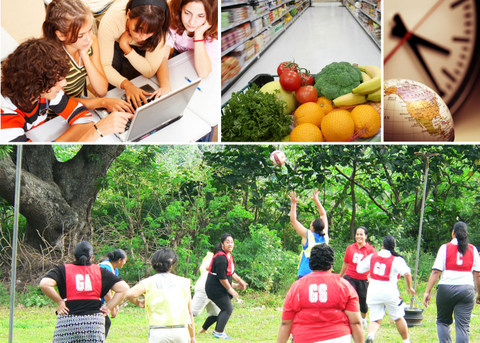
Adolescence is an important time where interventions that support the development of sustained health-promoting behaviours offer an opportunity to improve future health and wellbeing. Evidence from the field of Developmental Origins of Health and Disease (DOHaD) demonstrates that interventions at this time also offer intergenerational impacts associated with improved outcomes for future offspring.
Schools are a significant setting for interventions that facilitate the development of life-long capabilities associated with sustained health-promoting behaviours. The challenge of such interventions lies in the need to work across and within the participating sectors, and recognise the need to measure impacts on learning outcomes before assessing whether programmes have altered health-related behaviours.
From 2014 to 2016 an international team with expertise in education, science and public health examined issues associated with the evaluation of school-based health interventions. Participants represented universities and government agencies in New Zealand, Australia, Cook Islands, Tonga, United States of America, United Kingdom, Hong Kong, South Africa and Norway. In 2015 the collaboration engaged with the World Health Organization’s Commission on Ending Childhood Obesity regarding issues of design and assessment of school-based interventions. Representatives of the collaboration from New Zealand, Cook Islands and Tonga met with the Commissioners and presented arguments developed by the WUN collaboration promoting the need for school-based interventions to link to the core mission of schools, and for evaluation to assess learning before assessing health impacts.
In 2016 the collaboration published a framework that informs the development and evaluation of schoolbased health interventions and addresses the identified gap in the literature associated with measurement of health-related capability development during adolescence.
From 2016 to 2017 members of the collaboration engaged in programmes that evolved from the published framework and identified evidence gaps that could inform increased engagement in the intergenerational potential offered by school-based interventions.
(a) Knowledge of adolescents, parents and current or future teachers and health professionals regarding the intergenerational potential of interventions during the adolescent period is being or has been assessed in cohorts in Japan, New Zealand, Bangladesh and the Cook Islands. Results are informing intervention design and/or professional education. This is currently associated with one postgraduate project and one summer internship.
(b) Our integrated health-education assessment framework has been applied to a pilot project in the Cook Islands. Three postgraduate students are involved in this project.
In 2018 the collaboration will host a one-day workshop at the University of Sydney prior to a symposium during the ANZ DOHaD conference. These events will provide an opportunity for participants to engage in an exploration of our intervention framework, and evidence from a range of effective programmes. The workshop will focus on potential opportunities for future collaborations across WUN and non-WUN partners.
Selected outcomes
- In 2018 the collaboration will host a one-day workshop at the University of Sydney
- In 2016 the collaboration published a framework that informs the development and evaluation of schoolbased health interventions and addresses the identified gap in the literature associated with measurement of health-related capability development during adolescence.
- In 2015 the collaboration engaged with the World Health Organization’s Commission on Ending Childhood Obesity regarding issues of design and assessment of school-based interventions.
- Held workshop titled ‘Scientific and health literacy for adolescents: Strategies for assessment of competencies required to support NCD risk reduction’ at the University of Auckland, June 2014.
- Held WUN Adolescent Health Literacy Workshop – Defining Health Literacy Capabilities for Adolescents, December 2013.